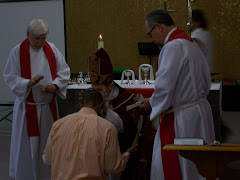The season of Lent is dedicated to examining our relationship with God in preparation for the celebration at Easter of the most significant event in history, the death and resurrection of Jesus the Christ (Messiah). This Sunday's scriptures, particularly the gospel lesson from Luke, reveal the nature of the Kingdom, the coming of the reign of God in the world.
Jesus is at a point in his three year ministry where the opposition to him is crystalizing. His own people expected the Messiah's coming to be dramatic with a show of power that would quickly change conditions. Jesus uses three images to counter the view.
First, Jesus says the kingdom is like a mustard seed, which though small, grows into a tree (large bush really) where birds come to roost and find shelter. God begins to act in what seems to be small and insignificant ways, but the process will yield ongoing and permanent benefits. Perhaps the use of a bush to represent the kingdom was Jesus' way to emphasize the need to examine carefully how we assess what is important spiritually. What looks big, impressive, permanent, may be a deception.
Trees are a spiritual symbol. In an arid landscape, trees are a sign of life and a water source. Israel, God's people, are sometimes described as a tree or alternatively as a vineyard. In Psalm 1, a righteousness person is a tree planted by a river bank. The apostle Paul reminded Gentile believers that they were like grafts onto an existing vine. Trees can represent kingdoms that are eventually cut down, and those who are a part of it subject to destruction as well. Or individually, we are to be fruitful or become subject to pruning or removal.
The second image Jesus uses is yeast. A little yeast added to dough permeates it and transforms the bread as it bakes. Here Jesus is saying that the kingdom of God will do it's work often in mysterious ways, again what seems insignificant and small transforms all of life. As a spiritual symbol, yeast can be used to represent positive or negative influences. The season of Lent invites us to examine the influences in our life. Are you allowing God to influence and shape you, or are there infectious influences present which will eventually accumulate destructively in your life and destroy it?
The first two images emphasize that God's activity in the world cannot be thwarted or destroyed. However, the third image, a narrow door points to our need to actively enter into God's activity, to allow God's influence to touch and transform us personally, and to engage in God's work. Specifically, the narrow door refers to Jesus himself, the point of entry into a redeemed relationship with God which God has provided. In a pluralistic culture, the narrow door represents the offense of the gospel. Are there many paths to God, or has God given a path that requires a specific response? Jesus says that when the kingdom comes near, we must choose, and specifically, we must choose Jesus. Relationship with God is not automatic, and cannot be pursued at a distance. Jesus tells those who were listening to strive to enter in through the narrow door.
There you have it. God's activity in the world will not be thwarted. God's activity in the world is pervasive. Finally, God's activity in the world, with each personally, with you, demands a response. How are you responding to Jesus? Are you in?
Saturday, February 6, 2010
Subscribe to:
Post Comments (Atom)


No comments:
Post a Comment